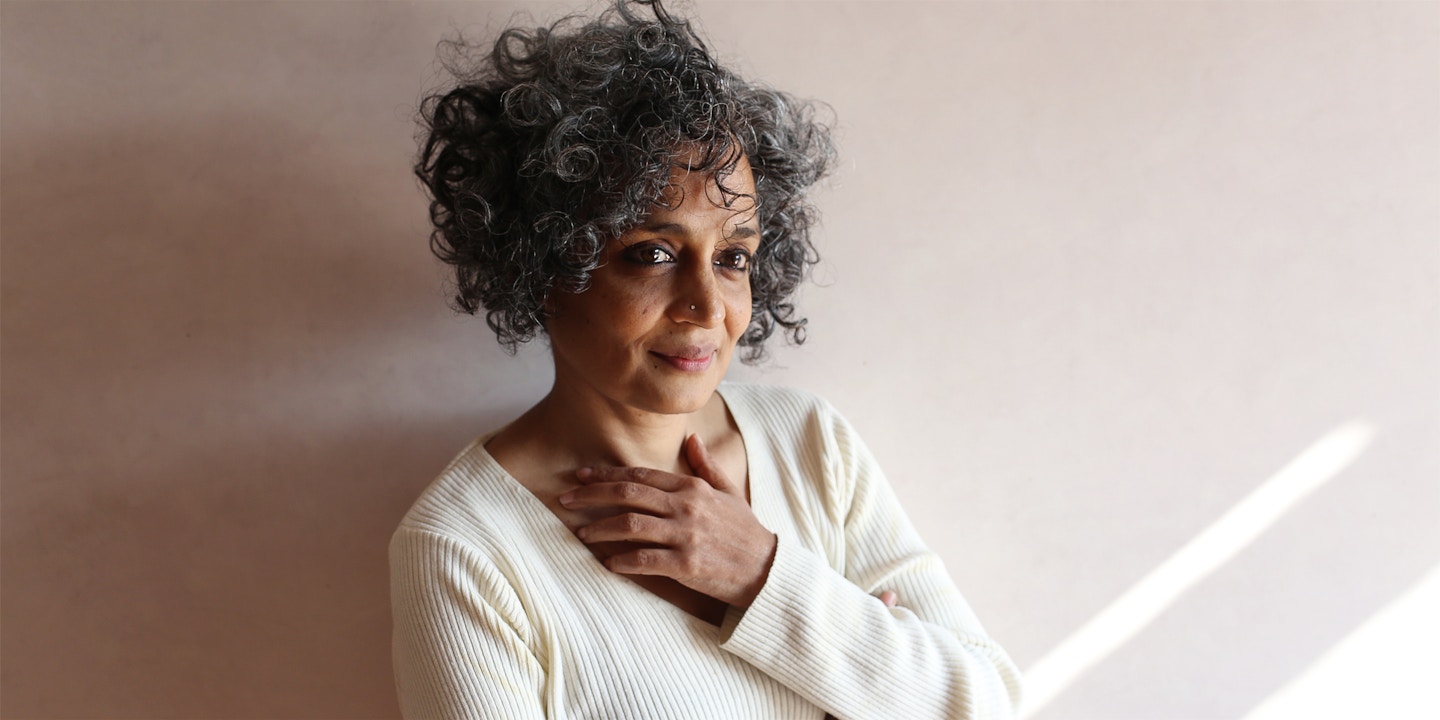by JEREMY SCAHILL

Twenty years ago, Indian writer Arundhati Roy published her debut novel, “The God of Small Things.” It won the ultra-prestigious Man Booker prize and propelled her to international fame. But it was not until last year that her second novel, “The Ministry of Utmost Happiness,” was published. Both her novels are beautiful, powerful epic stories.
So what did Roy do for those 20 years besides working on her latest novel? She used her very significant platform to fight for justice in causes and movements across the world. She was a ferocious and poetic opponent of the Iraq War and came to New York City to join in the massive street protests against the Republican National Convention at Madison Square Garden in 2004. Democracy Now! host Amy Goodman and I actually brought her onto the floor of the RNC the night Dick Cheney spoke. Roy has traveled the globe, speaking at rallies and marches and gatherings. In India, she has been an advocate for the most vulnerable and dehumanized people. She has traveled Kashmir and told the stories of government crimes and brutality, and the resistance to them. She has defended Muslims when they’ve been threatened, attacked, or massacred. And she has published many nonfiction books and collections of her speeches, including such titles as “Field Notes on Democracy: Listening to Grasshoppers,” “War Talk,” “Walking with the Comrades,” “The End of Imagination“. Most recently, she and actor John Cusack published a book on their meeting with National Security Agency whistleblower Edward Snowden, whom they traveled to see with Pentagon Papers whistleblower Daniel Ellsberg. That is called “Things That Can and Cannot Be Said.” Roy is going to be coming to the U.S. in May and will be speaking in a number of cities. On the latest “Intercepted,” we spoke with her. What follows is a transcript of the entire conversation.
Jeremy Scahill: Arundhati, welcome to Intercepted.
Arundhati Roy: Thank you, Jeremy.
JS: And congratulations on your second novel, “The Ministry of Utmost Happiness.”
AR: Oh, thank you again.
JS: So, I want to begin just by asking you about the dedication. You dedicated this novel to “the Unconsoled” and I’ve seen you in the past say that all of us, in some way, are, “the Unconsoled.” But talk about that dedication.
AR: Well, I guess in some ways, the dedication is to those people who, like the people in the book, don’t fit into the categories that the ruling establishment, as well as, quite often, the radical resistance put people in. So for me, one of the things is about the questioning of these categories, particularly the categories in India, because we are a nation of minorities — a nation that is divided into this tiny little fretwork of caste and ethnicity and language, and each is pitted against the other. And yet, all serve a pretty ancient hierarchy.
So, in some ways, this is dedicated to everybody, but to everybody who, in some real ways, doesn’t fit into that very complex grid that we are asked to fit into, and then jump up and down in, and even be radical in.
JS: Well and one of the themes that really jumped out to me as I read your novel was that sense of disconnected or disenfranchised people finding community with one another. And in the reviews that I read of the book, so many of them get wrong the identity of one of your central characters, Anjum. They identify Anjum as a transgender woman. But, in fact, Anjum, who was born Aftab, was born with both male and female gender organs. I think it would be really interesting if you could sort of explain that character, the reaction of her mother when she’s born and realizes that her child is not simply a male in gender.
AR: Her mother, Anjum’s mother, Jahanara Begum, when she discovers that about her baby, she goes through a series of reactions. But fundamentally and eventually, the problem for her is that her baby is beyond words in her languages. Because Urdu, which is the language that she speaks, gender is everything: chairs, carpets, musical instruments, books — of course, men and women — but everything has a gender, except her baby. And so, the question the book asks is: Is it possible to live outside of language?
But not only that, Jeremy. The issue is that that is not the only identity of Anjum, whether you — I mean, she thinks of herself as a woman, she becomes a woman in the end. But she lives in a place called a Khwabgah, which is called, which means in Urdu, the house of dreams. Inside, Old Delhi near Turkman Gate with a whole lot of other people who belong to indeterminate genders, and they are as complex as the outside world. There are men who became women; there are men who don’t have surgeries, there are Muslims, there are Hindus, there are Christians, they are people who believe in having surgeries, there are people who believe with just living with what you’ve got — it’s a whole range of genders just in that building.
Intercept for more
